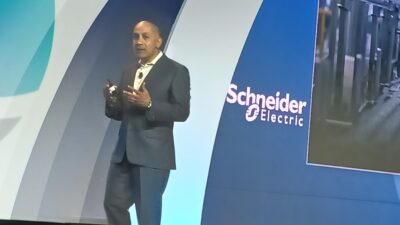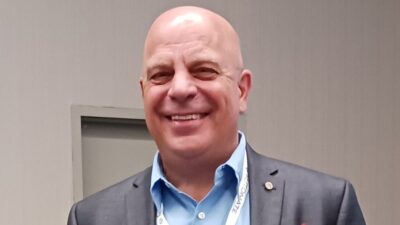In this issue:
Control Engineering safety system site update
Used process equipment available via the Internet
Ethernet getting faster and faster
Chaos conference
MIT modeling, simulation, and optimization course
Free CD teaches how to improve control loop performance
What’s in the April issue of Control Engineering
Dave’s public service announcement
2001 Editorial input opportunity
Safety system web site update
Last January, Control Engineering added a safety system section to the process control channel of the web site at www.controleng.com. The feedback on the quality of material posted on this site has been quite good. If you are involved in any way with safety systems in process control applications and have not visited our web site you should. You will find articles about new boiler burner management standards, where to obtain a free catalog of property loss prevention resources, what regulations and standards apply to safety systems, how to comply with performance based safety standards using layer of protection analysis, how to develop and use risk assessment models, and much more.
Back to top
Used process equipment now available via the Internet
Several companies, on and off the Internet, offer to put buyers and sellers of used process equipment together, but as far as I can tell, Federal Equipment Company (Cleveland, O.) is the only one that physically brings the equipment into their facility and inspects, tests, and guarantees it will work as expected. This is not a new concept for Federal Equipment, as they have been doing this since 1945. Only recently, however, have they joined the e-commerce flurry. At any given time, Federal Equipment has about 5,000 pieces of equipment available for immediate delivery, for about 30-60% less than new equipment (they also lease equipment). Among the items available on Apr. 10 were 9 compressors, 14 columns and towers, and 44 stainless steel heat exchangers. For more information about Federal Equipment’s used equipment visit www.fedequip.com .
Back to top
Is there no end in sight?
At one time, Ethernet was considered to be non-scalable, but that myth was destroyed years ago. In June 1998, the IEEE Standards Board approved and ratified the IEEE 802.3z standard for Gigabit Ethernet. Since then shipments of Gigabit Ethernet products reached almost $2 billion for 1999 and forecasts are for about $3 billion for 2000. But if Gigabit Ethernet isn’t fast enough, 10-Gigabit Ethernet is apparently on the way. While neither may be necessary or even appropriate for the plant floor, ongoing Ethernet development efforts can’t help but improve the capability and reliability of Ethernet products increasingly making there way to the plant floor.
Back to top
Two continuing education opportunities
There are several adaptive software applications emerging that promise to help solve complex business problems. One such solution is called Chaos Theory. The principles behind Chaos Theory, Complex Adaptive Systems, and Emergent Behavior seem to be finding a niche in the process control and manufacturing arena. Chaos and Complexity Theory are in use today, running complex process control and manufacturing systems much the same way as a complex biological or economic system where network interactions of events and requirements must constantly evolve to survive. Attending the Chaos in Manufacturing Conference in Santa Fe, New Mexico in May would be one way to learn where these principles are being successfully applied to help you determine how these principles could help bring order to your chaotic process control and manufacturing problems. For more information, visit www.barn.org or call Amanda at (603) 878-4365.
If you think Cambridge, Mass. might be a good place to spend a week in early August, consider signing up to attend MIT ‘s (Massachusetts Institute of Technology’s) summer professional program on modeling, simulation, and optimization of chemical processes. Among the topics to be covered are:
The future of computer-aided chemical engineering;
Steady-state process simulation;
Dynamic process simulation;
Treatment of uncertainty in chemical process modeling;
High performance computing in the chemical processing industry;
Batch process modeling and simulation;
Nonlinear programming and process optimization; and
Real time/on-line optimization. Each course day is a combination of lectures and hands-on electronic workshops.
For more information, visit web.mit.edu/professional/summer .
Back to top
Free control loop performance training CD
Of all the articles Control Engineering publishes, the ones about improving process control loop performance are always a big hit with readers. Everyone understands that badly performing process control loops reduce profitability and just maybe a few of those poor performers will improve after working through the case study and in-depth articles on optimizing process loops available on the training CD from ExperTune (Hubertus, Wis.). For more information on receiving this free training CD visit www.expertune.com or call Glenn Lovensheimer at (262) 628-0088.
Back to top
April’s Control Engineering
Going Fast with Wireless Technology Even if you don’t have an interest or need for wireless technologies, take a few minutes to read my April cover story. Included in the story is how wireless technologies are used in motor sports. After you read the article I think two things will happen. First, your eyes will be opened to how sophisticated motor sports has become. Second, your perception of the usefulness of wireless technologies in industrial applications will change.
Contact Temperature Sensing Contact temperature sensing is often thought of as the ‘low tech’ solution to obtaining the most frequently measured process variable. Jesse Yoder of Flow Research takes an exclusive look at various sensing technologies and the influences of recent developments.
SPC/SQC: Closing the Loop This article investigates trends in statistical process control/statistical quality control (SPC/SQC) software, and looks at the latest software features. Also included are 10 questions to ask before buying SPC/SQC software.
Curing Resonance in Motion Control Systems Resonance is an undesirable condition that creates instability and lowers the performance of motion control systems. George Ellis of Kollmorgen addresses what resonance is, where it comes from, and how to recognize it in a system. Most importantly, the article will discuss how to cure resonance to improve motion system performance. A software tool will be used to illustrate an example solution.
How to Build A PC-Based Control System This article discusses how to build a PC-based system, what products to look for, and how to avoid some pitfalls.
Product Focus: Terminal Blocks This is original Control Engineering research examining terminal block trends and user issues. Recent product descriptions from leading suppliers are included, along with research results.
Back to Basics: Grounding Grounding and bonding of electrical systems is mainly used to control dangerous over voltages and is important for personnel safety. Dirty grounds can create phantom business interruptions. Learn what it takes to be well grounded.
Back to top
Dave’s public service announcement
Do you find yourself spending a lot of time conducting Web searches using different search engines only to find a lot of the hits are duplicates? Several months ago a friend told me about Copernic2000. Copernic is a Web search productivity tool that simultaneously uses the best search engines, allows you to search for English, French, German, Italian, and Spanish content, and displays the results ranked by relevance, with summaries. Copernic2000 is available in several versions, each with added functionality, but the basic tool is free. To learn more about Copernic2000, visit www.copernic.com .
Back to top
Editorial input request
My August article is about the benefits of training. I’m collecting short stories from users who are willing to quantify the benefits gained from attending job related training courses. If you have a training benefits story to share (about 250 words maximum), send it to me at [email protected] . Also, here’s your chance to influence Control Engineering ‘s 2001 editorial calendar. In the next couple of months the editors of Control Engineering will meet to plan the editorial calendar for 2001. Send your thoughts on the types and contents of articles that are most useful to you to [email protected] .
Back to top



